Τhe Meltemi winds are strong northern winds that blow in the Aegean Sea in Greece during summer. Here is some information on the windy Greek islands and how to cope with them when on vacation in Greece!
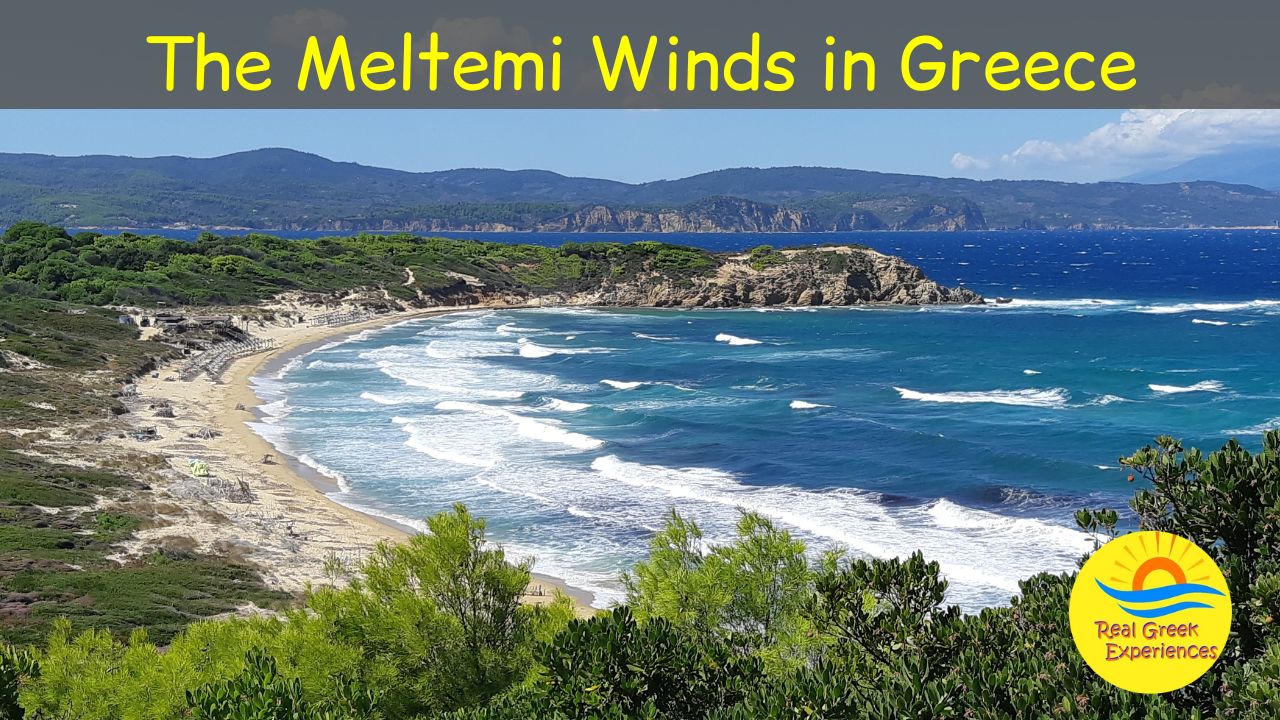
What are the Meltemi winds Greece?
The Meltemi winds are strong, dry winds that appear all over the Aegean Sea during the summer months. They typically blow from the north, north west or north east, and can affect swimming, sailing cruises, and even ferry trips.
In Greek, those seasonal winds are known as meltemi or meltemia. Ancient Greeks used the word etesian winds, which indicated a seasonal wind appearing every year.
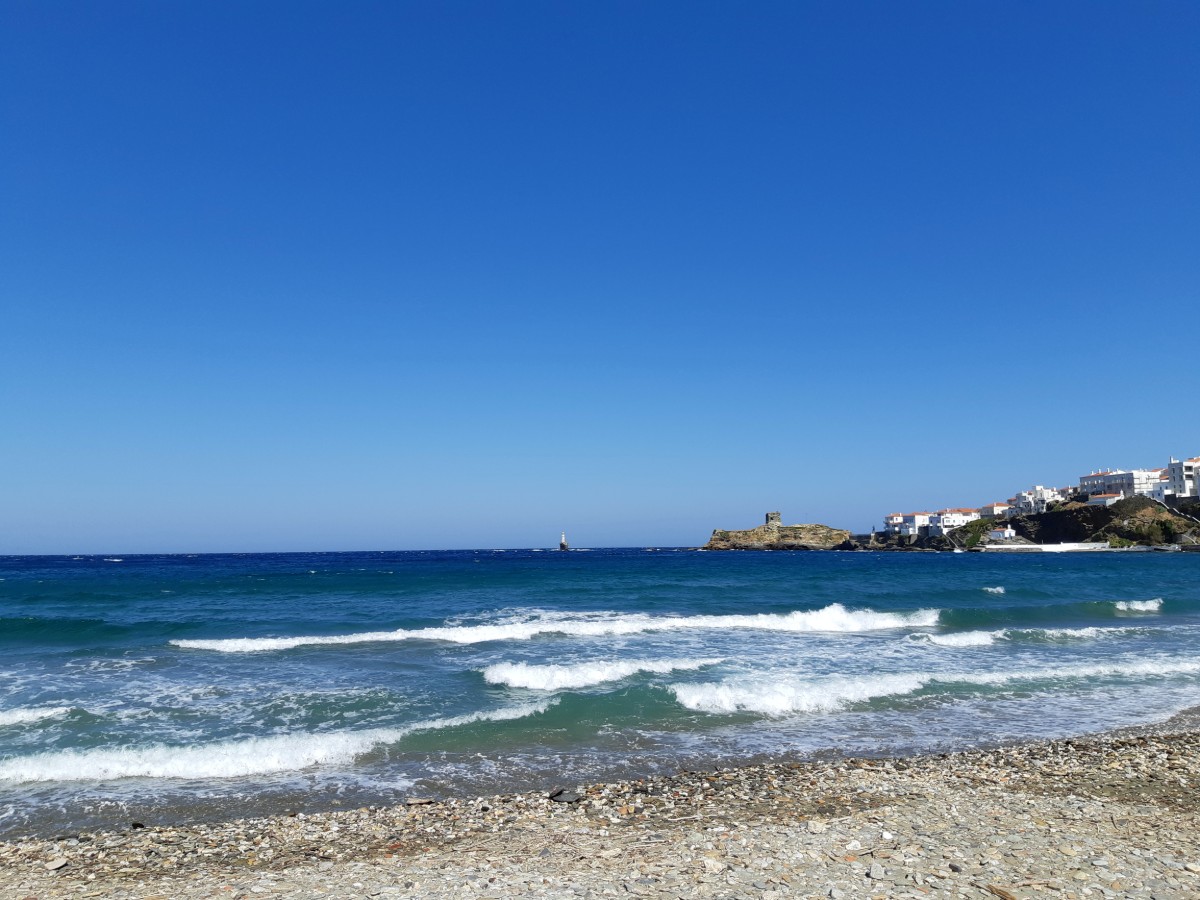
Τhe word meltemi most likely comes from the Turkish word meltem, which means a gentle summer breeze. In reality, the meltemi winds in Greece are nothing but gentle!
Meltemi winds can reach force 7-8 on the Beaufort wind scale, or even more. In certain areas, the winds may occasionally be exceeding speeds of 100 km (62 miles) per hour!
What causes the Meltemi winds?
Believe it or not, the meltemi wind is connected to the Indian monsoons and the Azores anticyclone. It can also be affected by rainfall in Central Europe and the Balkans.
These weather conditions cause differences in the pressure of the atmosphere above the Aegean, resulting in strong winds over the Aegean.
Channeling of the wind between the islands causes its speed to increase further. Since there are so many islands in the Aegean Sea, the meltemi can be exceptionally strong!

I won’t go into more detail here. Meteorology buffs can find plenty of information online on what causes these strong seasonal winds in Greece.
And now, let’s get to some practical info for those of you planning a trip to Greece during the meltemi season!
Which Greek islands are most affected by the meltemi winds?
All in all, the answer to the question “Is it windy in Greece”, is “It depends on where you are going”. Generally speaking, there are several windy Greek islands.
The groups of islands that are more affected by the meltemi are the ones in the Aegean Sea, such as the Cyclades and the Dodecanese. Have a look here for an introduction to the Greek island groups.
People who have visited Mykonos, Santorini or Naxos in summer will be familiar with the Cyclades wind. The nearby Andros or Tinos are two of the windiest Greek islands, with winds often reaching force 7-8 on the Beaufort scale.

Other islands that can be impacted by the meltemi are the Dodecanese, like Rhodes or Nisyros, the Sporades, like Skopelos, and the islands of Northeastern Aegean. The Aegean side of Evia island is also very exposed, as is the area between Evia and Andros.
If you are visiting mainland Greece, some areas will be windier than others. As an example, the Aegean beaches of Pelion peninsula are not protected at all. Same with the question “Is Crete windy” – Crete’s long sandy beaches on the northern coast are very exposed to the winds.
Which are the least windy Greek islands?
You’ll be pleased to know that some areas in Greece are not affected at all by the meltemi winds! These include the Ionian islands, such as Corfu and Kefalonia, and the coast of Western Greece.
The tall mountain ranges in mainland Greece act as a wind-stopper, protecting the Ionian side and the west coast of Greece.
There’s a drawback though – those areas are more humid, and can feel warmer. In addition, they generally attract more mosquitoes, as the winds helps keep the mosquitoes away! Speaking of which, here are some tips on how to avoid mosquitoes in Greece.
When do the meltemi winds blow?
The meltemi etesian winds in Greece appear in summer. They are strongest during July and August, but you may also come across them in June or September.
The meltemi generally blows during the daytime, typically being at its strongest during the afternoon and early evening, and dies down at night. That said, it’s not uncommon to have full-blown wind even in the early morning or late evening.
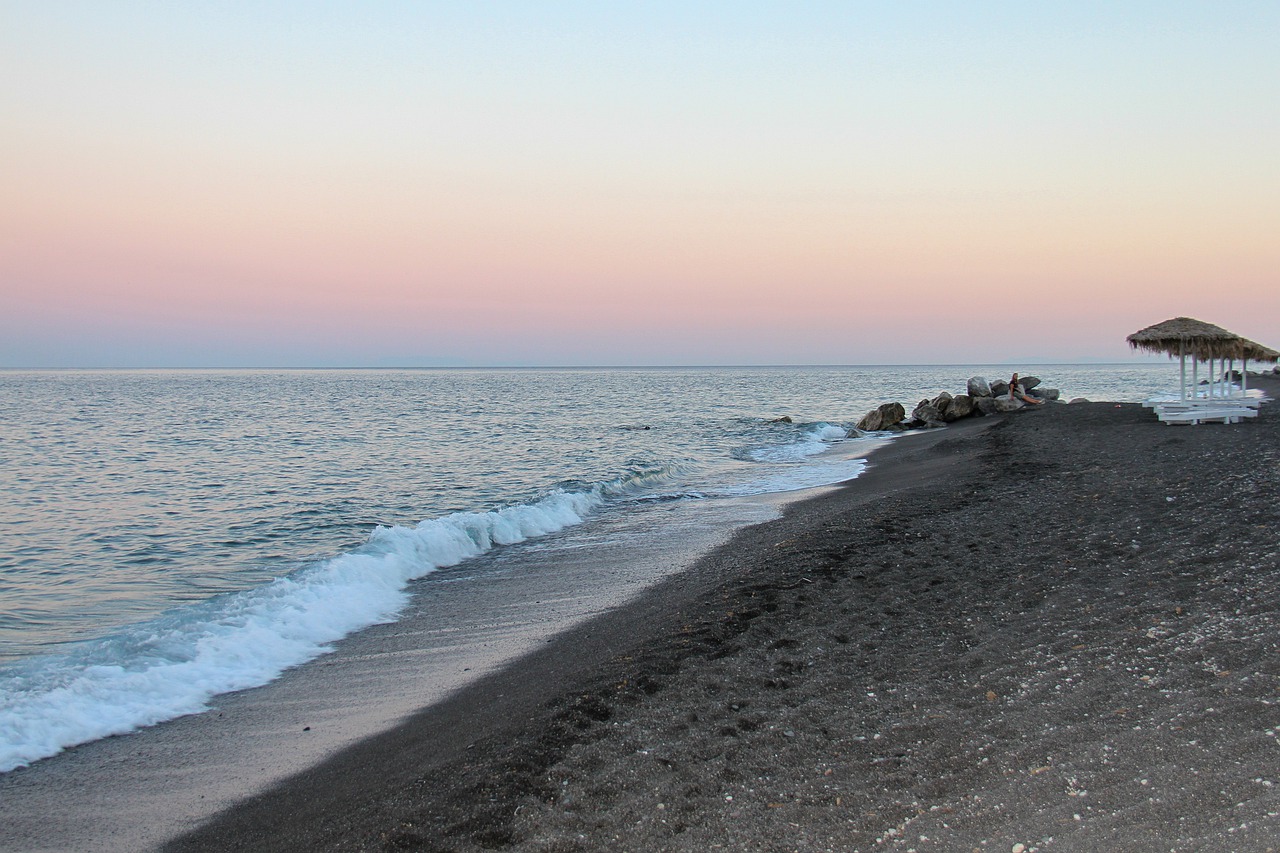
This is why, in typical Greek fashion, I suggest bringing a light jacket with you, even if you are visiting in summer!
There’s no guarantee over how many days the meltemi will go on for. Sometimes, you may get a few windy days, followed by a calmer week. Or you might get windy days non-stop.
If you can visit outside July and August, you have better chances of skipping the windy days. In addition, the islands will be less crowded, and accommodation prices will typically be lower.
Still, if you can only visit the islands in Greece in July or August, go for it – all these other travellers can’t be wrong!
Will the meltemi wind affect my holiday?
The meltemi winds can be difficult to get used to, especially for people who didn’t expect them. If you are mostly looking to lie on the beach all day long, the meltemi will probably affect your vacation to a certain extent.
On some days, staying on the beach will not be as relaxing as you hoped. The wind will blow up the sand, which can get really annoying. This is more so if you are lying on a towel right on the beach, rather than a lounger.
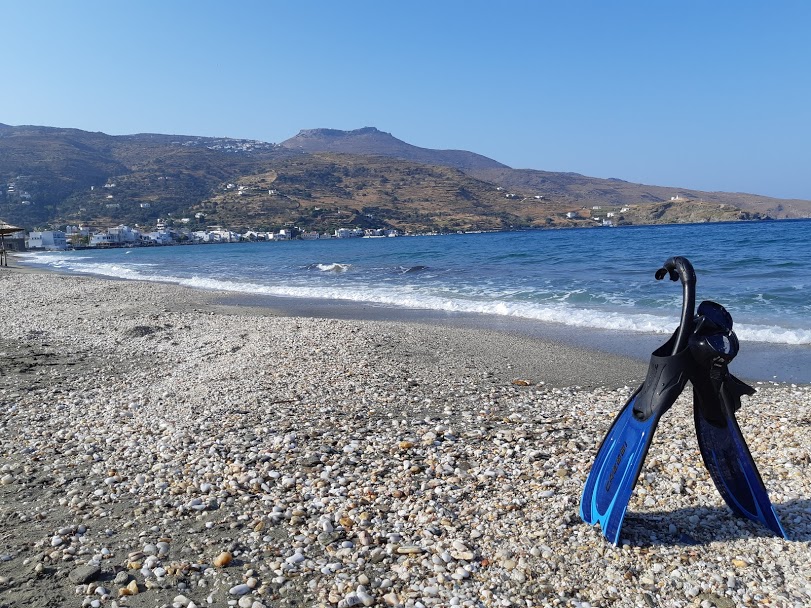
To be honest, there is not much you can do about it. Just go with the flow, and remember that it’s not all bad – you are in Greece after all!
On the plus side, if it wasn’t for the meltemi winds, temperatures in the Aegean would be a lot higher, and most people would find it uncomfortable to visit the Greek islands in summer. Indeed, without any wind, temperatures would have been unbearable.
Also, the meltemi clears the atmosphere, providing great visibility. Nothing like the bright blue summer skies in the Aegean!
How to cope with the meltemi winds in Greece
If you are visiting Greece during the meltemi season, my best advice is to avoid the beaches facing north, north east and north west. As the winds are coming from the north, the northern beaches are the ones that will be most exposed.
Your hotel owner or other locals should be able to point you to the best sheltered beaches for meltemi days. Occasionally, they will point you to a pebbly beach, or a rocky outcrop.
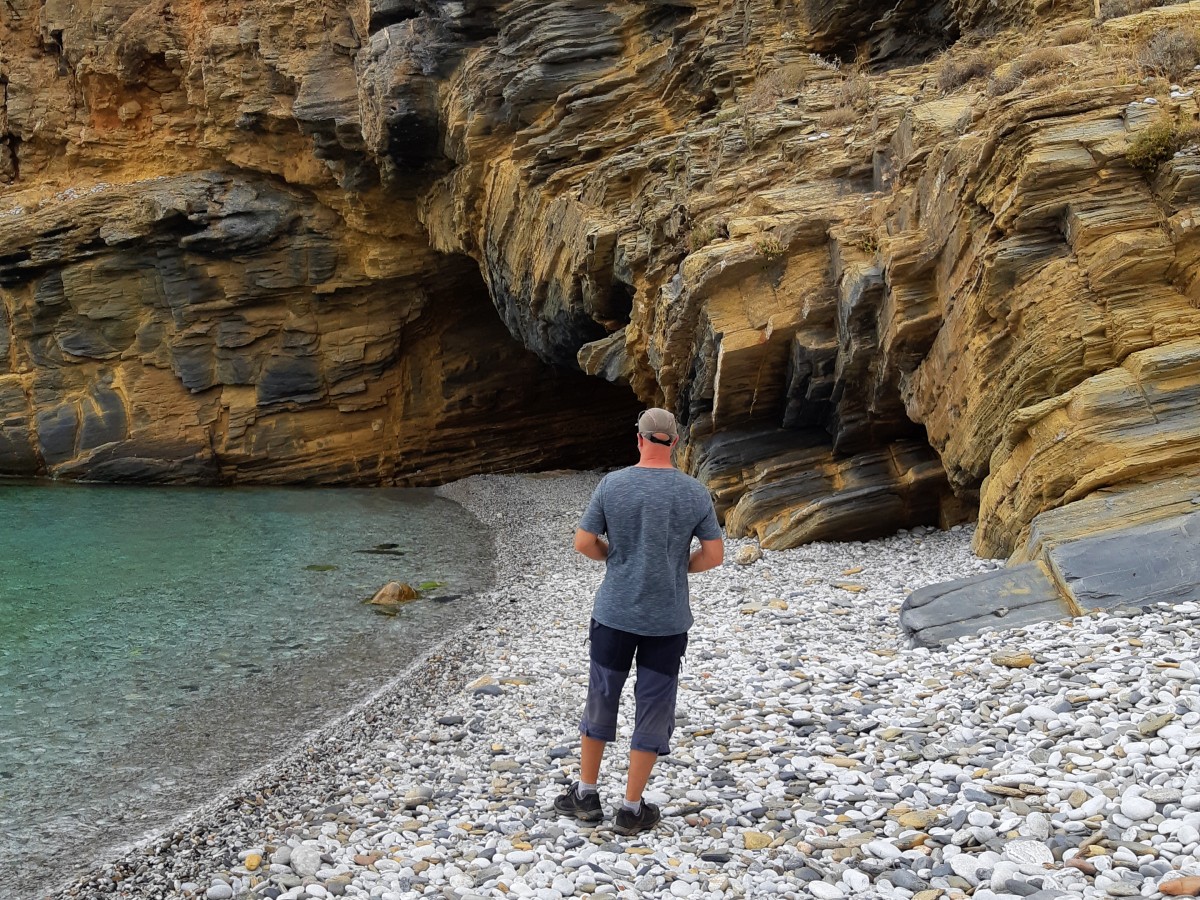
If you are on a bigger Greek island like Naxos or Andros, you can always find a beach that is fairly protected. This might mean that you may need to drive a long distance.
Or, you may want to spend less time on the beach and do other things instead. For example, you can go sightseeing or hiking, or spend some extra time in the local tavernas!
Swimming with meltemi winds
Sand getting in your eyes may be annoying, but the most important thing when the meltemi blows are the waves. Even if you are a good swimmer, you should be very careful, or maybe avoid swimming altogether.
Combined with the strong currents in Greece, the meltemi is not to be taken lightly. In fact, on very windy days you may see a red flag on certain beaches. This means that swimming is not allowed, as it can get dangerous.
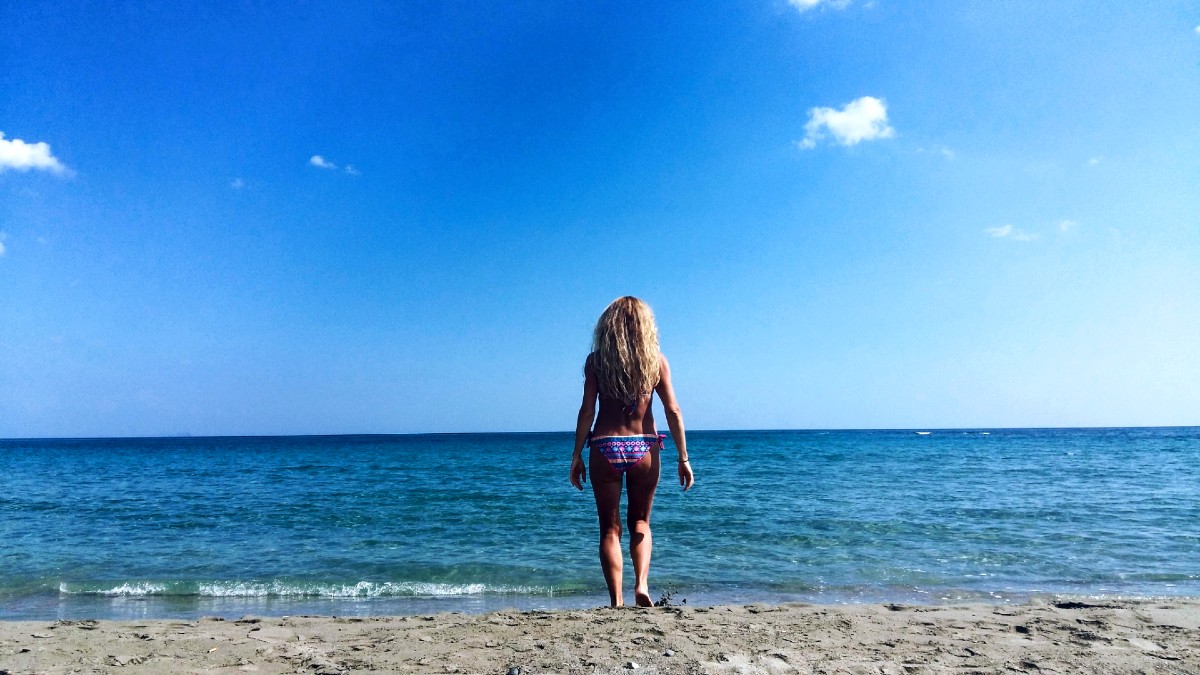
In all seriousness, you can get swept away on a windy day. It can happen to anyone, and it is scary. It’s happened to me in Northern Crete, and I’m a fairly competent swimmer – I will never forget that day!
This is not meant to discourage you though. You just need to use your common sense, and respect nature.
If you are travelling with small children, you could consider booking a hotel with a pool. It would be a more pleasant option than the beach on a windy day.
Sailing in Greece with the meltemi winds
Apart from your beach time, the meltemi Greek winds can also impact sailing trips in Greece. If you have booked a summer sailing cruise around the Aegean, the company will typically warn you that the itinerary is subject to weather conditions.
This is not because they are lazy to take you to the Cyclades. It’s because they want you to have a safe, enjoyable experience on board.

If you are planning to rent a boat or yacht, you will need to keep an eye on weather reports on an hourly basis. This is even more so if you are not familiar with the area and the speed that the winds can reach.
Meltemi etesian winds can pick up incredibly fast, and they appear seemingly out of nowhere. You don’t want to be caught unprepared. Your safety is far more important than reaching a windy island. Plus, sailing in strong winds is not a pleasant experience by anyone’s standards.
Meltemi winds and boat tours
If you are planning to take a boat tour when you are on an island, it’s best to book it for your first day on your destination. This way, if it gets cancelled due to the strong winds, you can hopefully re-book it for the next day.
For example, take a look at these boat tours in some of the Cyclades islands:
- Catamaran tour in Santorini
- Full day boat-tour of Milos and Polyaigos
- Boat tour from Mykonos to Ancient Delos and Rhenia
Meltemi winds and ferry cancellations
In case of extreme winds in the Aegean Sea, some of the high-speed ferries may not depart from the ports at all. Even the bigger Greek ferries can be delayed.
One summer, we were stuck in Andros port inside our car, watching our ferry trying to dock at the port for well over an hour. I am certain that I learnt a couple of new Greek swear words on that day.

Many visitors take a ferry to Piraeus, and fly back home from the Athens airport. If this is you, you should consider spending at least one night in Athens before you fly out. This way, in case of a ferry delay or cancellation, you will still have enough time to get to Athens in time for your flight.
Here is a guide with more tips on how to plan your Greek island hopping trip on your own.
You can easily book ferries on a search engine called Ferryscanner.
Windsurfing and meltemi winds
If you are visiting Greece to go windsurfing or kitesurfing, the meltemi can be your friend. There are several beaches in Greece that are ideal for these sports. In fact, windsurfing is a fairly big thing in the Aegean Sea.
Mykonos, Tinos, Andros, Ios, Paros, Antiparos, Naxos, Milos, Kimolos, Rhodes, Karpathos, Crete and Evia are just a few of the Aegean islands where you can go windsurfing.
Your instructor will explain what to be aware of, and you should follow their advice. Again, keep an eye on weather reports, and do not compromise your safety.
We went kayaking in Mykonos in June, just before the start of the Meltemi season, and were blessed with calm waters. Same when we went kayaking in Rhodes in late April. Something to keep in mind for when planning water sport activities!
FAQs about Meltemi Greece
Here are a few questions I get now and then:
Is it always windy in Mykonos?
Mykonos usually gets windy in July and August. June and September are better months to avoid the meltemi winds in Mykonos.
Is it windy in Rhodes?
The western side of Rhodes island can get windy in summer. The beaches on the eastern coast are usually calmer in terms of wind, but can also get uncomfortably warm in peak season.
Is Corfu windy?
During the summer, Corfu doesn’t get as windy as some other Greek islands. Yet, the west coast is less protected from the winds than the east coast, which faces the mainland.
What is the least windy beach Mykonos?
Some of the least windy beaches in Mykonos are Platys Gialos, Ornos, Paraga, Paradise and Super Paradise. As they face south, they are more protected from the meltemi winds.
How can I avoid the meltemi winds?
If you go to the Aegean islands during July and August, you are likely to come across the meltemi winds. The beaches facing south will generally be calmer than the beaches facing north. If you visit the Aegean islands outside July and August, you have more chances of calmer weather.
The meltemi winds in Greece
I hope this article was enlightening. Bottom line – don’t worry too much about the meltemi winds, but do be careful when it comes to swimming. If you have any other questions, please ask in the comments below!
Also read:
- Interesting facts about the Greek flag
- Useful words and phrases in Greek
- Hottest Greek islands in October
- Athens in November
- The best SIM card for Greece
- Strikes in Greece and how they can affect your vacation
- The evil eye in Greece
 Hi! I’m Vanessa from Athens. I’ve spent most of my summer holidays on the windy Greek islands in the Aegean Sea, and no meltemi will ever stop me going back! I’d love to know if you’ve had experience of this seasonal Greek wind during your vacation – please let me know in the comments! Follow me on my social media for more Greece-related news and inspiration:
Hi! I’m Vanessa from Athens. I’ve spent most of my summer holidays on the windy Greek islands in the Aegean Sea, and no meltemi will ever stop me going back! I’d love to know if you’ve had experience of this seasonal Greek wind during your vacation – please let me know in the comments! Follow me on my social media for more Greece-related news and inspiration:


Thanks for your lovely words about Greece!!
I’ve got some not-so-fond memories of getting stranded on Ai-Stratis island for a whole week, pre-ATM times. We inevitably ran out of money and had to sneak in the return ferry (at the time they didn’t check you upon boarding), only to be discovered by the crew a half-hour before we arrived to Rafina. Fun times 🙂
I fully understand. Unfortunately, some of the Cyclades islands are not ideal in that respect, as there are many stairs and hills. You could consider the Peloponnese as another option? Kalamata and the nearby areas are very interesting (and overall flatter)!
Hi and thanks for your question! The truth is, noone can predict 100%. Most beaches on Patmos were fine when we visited last summer, similar to Tilos, but it was a different time of year (late July). Fourni used to be well known among freecampers, and due to its coastline and location the south beaches would be protected. September is usually a mellow month, one of my favourites to travel around 🙂 Since you are going to Patmos, you should definitely go to Psili Ammos beach – have a look here for a complete guide of all the beaches in Patmos! Fantastic choice of places btw, enjoy!
Hi and thanks for your question! Kefalos in Kos is a much more sheltered bay than almost anywhere in North Crete, which is totally exposed to the northern winds – and the waves in North Crete can be really dangerous, I’m talking from personal experience… Unfortunately, however, it is impossible to predict the winds accurately so far in advance. On the whole, Kefalos is a safer choice, and if it gets windy the island is easier to get around and find a protected bay. Hope this helps!
Hi! Thanks for your questions! The wind is not exactly cold, I’d say it’s cool – in fact, it it wasn’t for the wind, the temperatures would often be unbearable. I’ve been to south Crete many times (a few different areas), Damnoni and the nearby Plakias are likely to be sheltered even with some wind. The wind wouldn’t affect the pool, but pools in Greece are usually not heated, which is something I’ve seen people complain about. Overall, if it’s too windy, you could avoid swimming in the sea and explore the villages and landmarks instead! Have a fabulous time – Crete is amazing 🙂
Probably sunset is better. I suggest you book it for your first day in Santorini, then you can move it a day or two forward if it gets cancelled!
May is usually fine! Then again with all the climate change it’s hard to tell 100%. Kythnos is a great choice as it’s very close to Athens. Enjoy your time!
Thankyou!!!